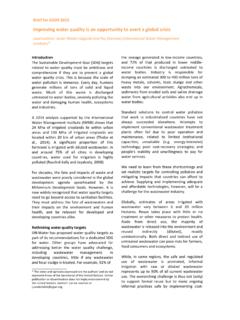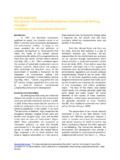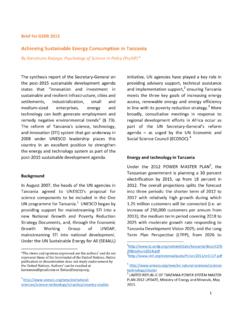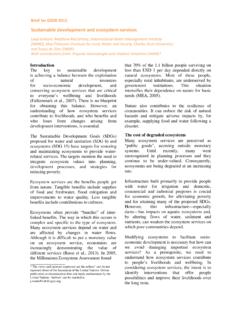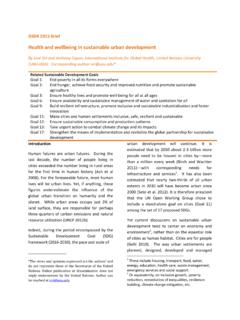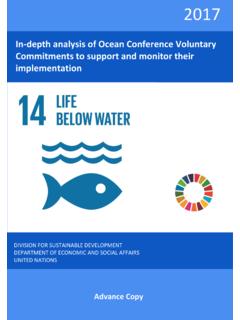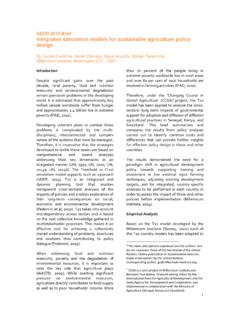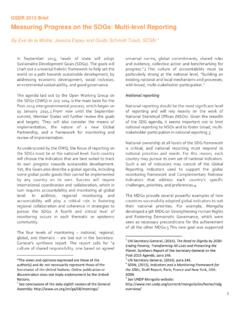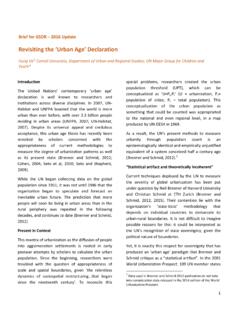Transcription of Cooperatives and the Sustainable Development Goals
1 Cooperatives and the Sustainable Development GoalsA Contribution to the Post-2015 Development DebateTABLE OF CONTENTSPart OneCOOPERATIVES AND THE POST-2015 twO Cooperatives AND THE PROPOSED Sustainable Development GOALS1) Poverty Reduction ..32) Gender Equality ..43) quality Education and Lifelong learning ..54) Health .. 55) Food Security and Good Nutrition ..66) Access to Water and Sanitation ..77) Sustainable Energy .. 78) Employment Creation, Livelihoods and Equitable Growth ..89) Sustainable Natural Resource Management ..910) Good Governance .. 1011) Promotion of Stable and Peaceful Societies.
2 1112) Cooperatives and Global Enabling Environment and Long-term Finance ..12 Part three WAY FORWARD TO THE Sustainable Development Goals : Cooperatives HAVE A KEY ROLE ..13endnOtes ..15 InstItutIOnal BackgrOund .. 16 Future readIngs ..16 Layout and Design by Jihea KhilCover Image by Clare-Pascale GentizonCONTRIBUTION OF Cooperatives TO Sustainable Development : A joint ILO and ICA initiativeSustainability is recognized as one of the five pillars of the International Co-operative Alliance s (ICA) Blueprint for a Cooperative Decade, which aims to position Cooperatives as builders of economic, social and environmental sustainability by 2020.
3 The United Nations Conference on Sustainable D e v e l o p m e n t ( R i o + 2 0 ) highlighted decent work as a central goal and driver for Sustainable Development and a more environmentally Sustainable economy. In order to bring cooperative voices into the discussion around the post-2015 Development agenda, the International Labour Organization (ILO) and ICA has launched an initiative on the contribution of Cooperatives to Sustainable Development . This brief summarizes the main findings of a forthcoming report of the same title, by Frederick O. Wanyama of Maseno University in Kenya, prepared as part of ILO s contribution to this initiative.
4 As we approach the Millennium Development Goals (MDGs) target date of 2015, global, regional, national and online thematic consultations have been taking place to frame the post-2015 global de-velopment agenda. A consensus on Goals , targets and indicators for Sustainable Development will have to be reached before the end of 2015. The big questions revolve around the ways the internation-al community will respond to the pressing issues of economic Development , environmental protection and social equity in a Sustainable manner. In total, about one billion people are involved in Cooperatives in some way, either as members/ customers, as employees/participants, or as or both.
5 Cooperatives employ at least 100 million people worldwide, and the livelihoods of nearly half the world s population have been estimated as made secure by cooperative enterprise. The world s largest co-operative enterprises have collective revenues of USD trillion, which are comparable to the GDP of the world s ninth largest economy - As value-based and principle driven organizations, cooperative enterprises are by nature a Sustainable and participatory form of business. They place emphasis on job security and improved working conditions, pay competitive wages, promote additional income through profit-sharing and distribution of dividends, and support community facilities and services such as health clinics and schools.
6 Cooperatives foster democratic knowledge and practices and social inclusion, making them well-placed to support the achievement of Sustainable Development . Cooperatives have also shown resilience in the face of the economic crises. Cooperatives AND THE POST-2015 DEBATE 1 Cooperative Principles1. Voluntary and Open Membership2. Democratic Member Control3. Members Economic Participation4. Autonomy and Independence5. Education, Training and Information6. Cooperation among Cooperatives7. Concern for CommunitySource: Hence, Cooperatives are well-placed to contribute to Sustainable Development s triple bottom line of economic, social and environmental objectives plus the governance agenda, not least because they are enterprises that endeavour to meet the economic progress of members while satisfying their socio-cultural interests and protecting the environment.
7 They offer an alternative model for enterprise, with contributions to Sustainable Development well beyond job creation. Since Cooperatives share in GDP and total enterprises is relatively small in most countries at present, the promotion and expansion of Cooperatives could be an important instrument for achieving the Sustainable Development Goals (SDGs).This brief highlights the contribution of Cooperatives to Sustainable Development and stimulates discussion on the role of Cooperatives in the design and implementation of the Sustainable Development Goals (SDGs) that will succeed the Millennium Development OneThe detailed content of the SDGs is already being discussed and debated by international organizations, states and civil society organizations.
8 Yet participation by Cooperatives themselves has only recently become active, and consequently voices of Cooperatives and the cooperative movement as a whole are not being heard clearly and their involvement in the process of developing SDGs has not reached its full potential. This is in spite of the fact that the 2012 Rio+20 United Nations Conference on Sustainable Development recognized the potential role of Cooperatives in the realization of Sustainable possible reason for the invisibility of the cooperative option in the debate is a lack of understanding of the actual and potential contribution that Cooperatives can make to Sustainable Development , partly due to the disparate nature of literature on this subject.
9 This review is an attempt to begin to fill this gap. The full report shows that though Cooperatives were not actively engaged in the design and implementation of MDGs, they made significant contributions to the realization of the objectives of these Goals . Since the post-2015 Development agenda substantially builds on the gains of MDGs, the contribution of Cooperatives to such gains reaffirms their relevance in the on-going debate on the post-2015 Development agenda. This is not just in the interest of continuity, but also for the sake of sharing experiences learned in the process of working towards the realization of MDGs that may help avoid past mistakes in designing the future Development agenda.
10 Cooperatives and the cooperative movement, therefore, have a wealth of experience to share that will help the design and implementation of the Sustainable Development more than half the respondents in an ILO survey of the cooperative movement indicated that they participated in the post-2015 consultations, the participation of Cooperatives in the design of the post-2015 Development agenda has been hampered for a variety of reasons. One reason is that Cooperatives tend to be more preoccupied with local issues than the national, regional and international ones.
